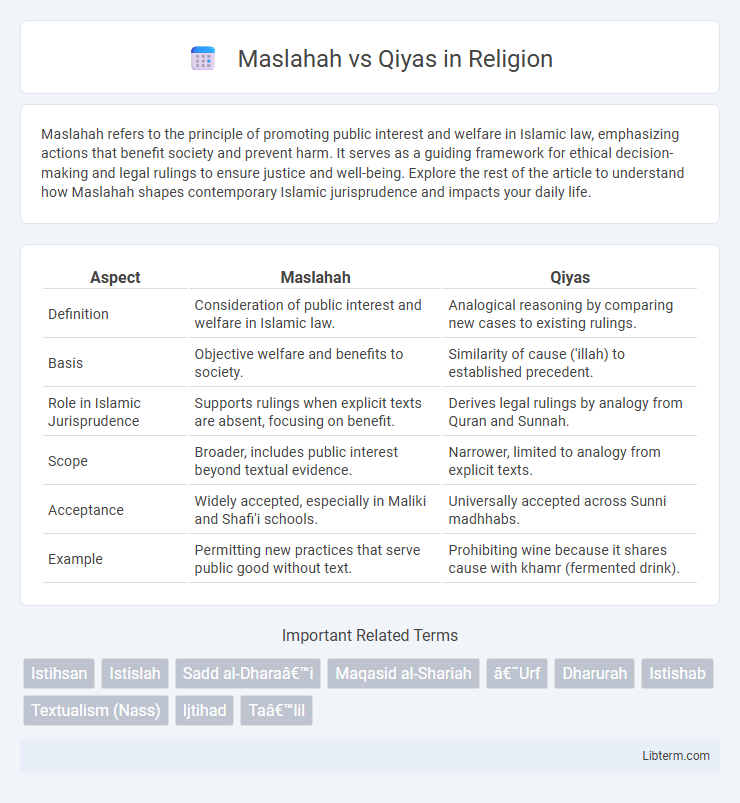Maslahah refers to the principle of promoting public interest and welfare in Islamic law, emphasizing actions that benefit society and prevent harm. It serves as a guiding framework for ethical decision-making and legal rulings to ensure justice and well-being. Explore the rest of the article to understand how Maslahah shapes contemporary Islamic jurisprudence and impacts your daily life.
Table of Comparison
| Aspect | Maslahah | Qiyas |
|---|---|---|
| Definition | Consideration of public interest and welfare in Islamic law. | Analogical reasoning by comparing new cases to existing rulings. |
| Basis | Objective welfare and benefits to society. | Similarity of cause ('illah) to established precedent. |
| Role in Islamic Jurisprudence | Supports rulings when explicit texts are absent, focusing on benefit. | Derives legal rulings by analogy from Quran and Sunnah. |
| Scope | Broader, includes public interest beyond textual evidence. | Narrower, limited to analogy from explicit texts. |
| Acceptance | Widely accepted, especially in Maliki and Shafi'i schools. | Universally accepted across Sunni madhhabs. |
| Example | Permitting new practices that serve public good without text. | Prohibiting wine because it shares cause with khamr (fermented drink). |
Introduction to Maslahah and Qiyas
Maslahah refers to the Islamic legal principle prioritizing public welfare and the common good, guiding judgments based on benefits and prevention of harm. Qiyas involves analogical reasoning, where rulings are derived by comparing new issues to established precedents in the Quran and Sunnah. Both methods serve as critical tools in Islamic jurisprudence to address novel legal matters while maintaining adherence to foundational texts.
Historical Development in Islamic Jurisprudence
Maslahah, emphasizing public interest, emerged prominently during the Abbasid era as jurists sought flexible tools for addressing new societal issues, contrasting with Qiyas, which relies on analogical reasoning based on Quranic and Sunnah principles. Early scholars like Al-Shatibi advocated Maslahah to complement rigid Qiyas, arguing it ensures law serves welfare and justice beyond literal texts. Over time, Maslahah became institutionalized in Islamic legal theory, especially within the Shafi'i and Maliki schools, balancing traditional Qiyas by incorporating broader ethical considerations in jurisprudence development.
Definitions and Core Concepts
Maslahah refers to the consideration of public interest or welfare in Islamic jurisprudence, prioritizing communal benefits and preventing harm, while Qiyas involves analogical reasoning to derive legal rulings by comparing new cases to established precedents based on shared underlying causes ('illa). Maslahah emphasizes objectives of Shariah (Maqasid al-Shariah) to ensure societal well-being, whereas Qiyas operates through deductive logic applying known laws to novel situations. The core distinction lies in Maslahah's focus on outcomes and public good, contrasted with Qiyas' reliance on formal analogy and consistency with established texts.
Foundations in Shariah Sources
Maslahah (public interest) and Qiyas (analogical reasoning) are foundational principles in Shariah that guide Islamic jurisprudence. Maslahah emphasizes the protection of essential objectives like religion, life, intellect, lineage, and property, aligning with the maqasid al-shariah framework found in the Quran and Sunnah. Qiyas derives rulings by analogizing new cases to established texts in the Quran and Hadith, ensuring consistency through evidence-based legal deduction.
Types and Classifications of Maslahah
Maslahah, a principle in Islamic jurisprudence, is classified into three types: dharuriyyat (essential needs), hajiyyat (complementary needs), and tahsiniyyat (embellishments), each addressing different levels of societal welfare and legal necessity. Dharuriyyat ensures survival and basic human rights, hajiyyat facilitates ease and removes hardship, while tahsiniyyat enhances quality of life without being compulsory. Unlike Qiyas, which relies on analogical reasoning from established texts, Maslahah emphasizes public interest and welfare in legal decision-making, allowing flexibility to adapt to changing circumstances.
Principles and Methodology of Qiyas
Qiyas, an analogical reasoning method in Islamic jurisprudence, derives legal rulings by linking new cases to established precedents based on effective cause ('illa). Its principles emphasize identifying a common attribute between the original case (asl) and the new case (far'), ensuring the ruling aligns with the Qur'an and Sunnah. Unlike Maslahah, which centers on public interest and welfare, Qiyas strictly applies a structured methodological process relying on textual evidence and rational analogy.
Differences Between Maslahah and Qiyas
Maslahah prioritizes public interest and welfare by considering the benefits and harms of a ruling, whereas Qiyas relies on analogical reasoning based on clear textual evidence from the Qur'an and Sunnah. Maslahah operates with a flexible, context-driven approach to address new or unprecedented issues, while Qiyas requires established comparable cases in Islamic law for deriving rulings. The scope of Maslahah is broader and can sometimes override strict analogical reasoning of Qiyas when addressing societal needs.
Contemporary Applications in Islamic Law
Maslahah, emphasizing public interest and welfare, is increasingly utilized in contemporary Islamic law to address modern issues like bioethics, finance, and environmental protection where explicit textual evidence is absent. Qiyas, or analogical reasoning, remains foundational for extending classical rulings to new cases but faces limitations in complexity and evolving contexts that maslahah can better accommodate. Scholars often prefer maslahah to harmonize Sharia principles with current societal needs, enabling flexible, context-sensitive legal rulings within Islamic jurisprudence.
Debates Among Islamic Scholars
Debates among Islamic scholars regarding Maslahah and Qiyas center on the sources of Islamic law, where Maslahah represents public interest and welfare, while Qiyas involves analogical reasoning based on the Quran and Sunnah. Scholars supporting Maslahah argue it allows flexibility and adaptation to changing circumstances, prioritizing societal benefits even when explicit texts are absent. Critics of Maslahah emphasize strict adherence to scriptural texts, viewing Qiyas as a more reliable method to maintain legal consistency and avoid subjective judgments.
Conclusion: Significance in Modern Context
Maslahah, emphasizing public welfare, offers flexible solutions to contemporary Islamic legal issues by prioritizing communal benefit over rigid analogy, as used in Qiyas. Qiyas relies on deductive reasoning from established texts, which may limit adaptability in addressing novel societal challenges. The integration of Maslahah into modern jurisprudence ensures that Islamic law remains dynamic and responsive to evolving ethical and social needs.
Maslahah Infographic

 libterm.com
libterm.com